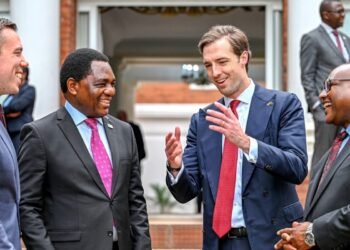Mulilo Kabesha fuelling tension, says ECL family
By George Zulu
ATTORNEY General Mulilo Kabesha has worsened the tensions between the former first family and the government over the repatriation of former president Edgar Lungu’s remains, lawyer Makebi Zulu has said.
Commenting on Kabesha’s Sunday Interview on ZNBC, Zulu accused Kabesha of pretending not to know the reasons advanced against President Hakainde Hichilema’s desire to attend the burial of Lungu.
He was speaking as the Lungu family’s spokesperson.
Lungu died in South Africa on June 5 where he had been receiving treatment since January this year but his body is yest to be buried because of the legal battle between his family and the government.
Zulu said Kabesha’s statement had made it difficult for the Lungu family to trust the government’s intentions to repatriate the body of the late former president.
He said Kabesha was aware of why the family did not want Hichilema near Lungu’s casket.
“The best Mr Kabesha should have done was to apologise to the Lungu family for how the former head of state was mistreated [while he was alive]. The statements made by Mr Kabesha have angered and infuriated the family. His statement on that programme is making the already tense situation even worse now,” Zulu said.
“Mr Kabesha’s level of insensitivity towards the death and repatriation of president Lungu’s body is unimaginable. And this casts more doubt as to whether the government wants to accord the former president the dignified send-off that they claim. The family is very disturbed by the continued abuse at the instigation of the State,” he said.
When he featured on the Newzroom Africa programme earlier, Zulu said the family would consider, according to the former president’s wishes, a private funeral.
He said the family had filed papers seeking to overturn a Pretoria High Court order that Lungu’s remains be handed over to the government for a state funeral.
Zulu said the decision to appeal was made because “the court did not address the gravamen of the matter” and had “focused narrowly on a purported agreement” between the family and the Zambian government.
“In its ruling, the court talked about pacta sunt servanda, that agreements must be respected. But then went further to change the concessions that were reached by the family,” he said.
Zulu said the South African court had failed to address key constitutional and human rights questions.
“The court did not address the right to dignity. It did not address who, as next of kin, is entitled to the body. That is a very important question. We felt the court erred when it said ‘public interest overrides that of the family’. And whose public interest? Which public was the court dealing with?” he wondered.
Zulu questioned the court’s jurisdiction in matters involving Zambia’s internal arrangements.
“If they were dealing with Zambian public interest, what clothes them with the authority to deal with the Zambian system?” he asked.
Zulu said Lungu died as a private citizen after the Zambian government stripped him all his retirement benefits alleging he had re-entered active politics.
“You cannot vilify someone in life, deny them access to medical care and then thrust honours upon them in death. That is a mockery to the family,” he said.
The family was ready to wait longer to get justice on the manner the remains would be handled.
“The point for the family is just one: to give the former president a dignified send-off. What is perceived as dignified by the family is not the government being in charge of the burial. That is the decision of the family, not the State. If invitations are to be extended, they will be extended to the necessary people. We respect the South African government and would not want to antagonise relations between South Africa and Zambia. But the remains belong to the family, and we would like that to be respected,” Zulu said.

























